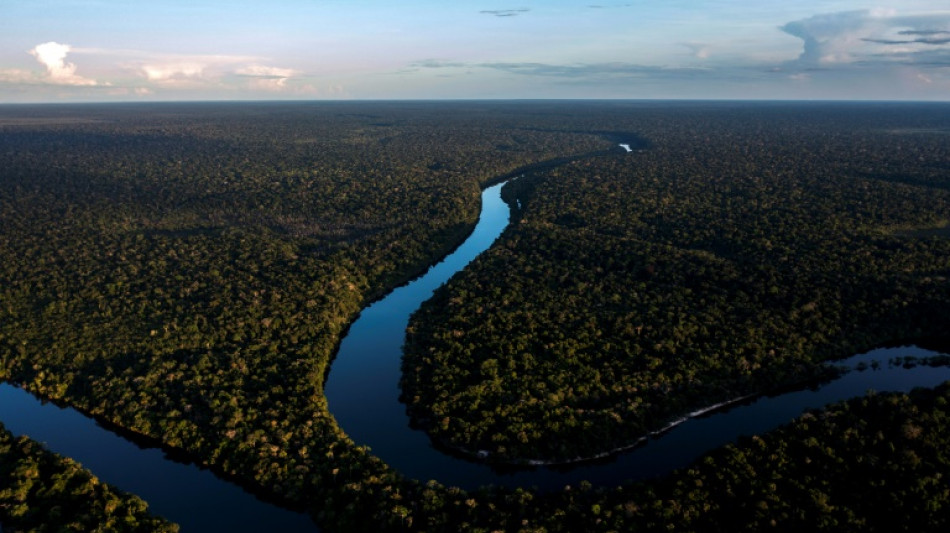
-
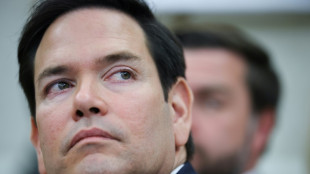 Rubio in Paris to meet Macron on Ukraine war
Rubio in Paris to meet Macron on Ukraine war
-
Asian markets boosted as 'Big Progress' made in Japan tariff talks

-
 Philippine film legend Nora Aunor dies aged 71
Philippine film legend Nora Aunor dies aged 71
-
Taiwan's TSMC net profit soars as US tariff threat looms

-
 Cartel recruitment at heart of Mexico's missing persons crisis
Cartel recruitment at heart of Mexico's missing persons crisis
-
Macron to hold Ukraine war talks with Rubio, Witkoff in Paris
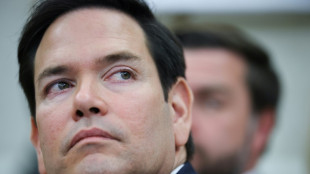
-
 Mahrang Baloch, a child of the resistance for Pakistan's ethnic minority
Mahrang Baloch, a child of the resistance for Pakistan's ethnic minority
-
Myanmar junta says to free nearly 5,000 prisoners in amnesty

-
 Taiwan's TSMC says net profit rose 60.3% in first quarter
Taiwan's TSMC says net profit rose 60.3% in first quarter
-
Hermes to hike US prices to offset tariff impact

-
 Sri Lanka's women-run hotel breaks down barriers
Sri Lanka's women-run hotel breaks down barriers
-
Sweden turns up Eurovision heat with wacky sauna song

-
 Sweden goes into Eurovision as punters' favourite
Sweden goes into Eurovision as punters' favourite
-
Spanish youth keep vibrant Holy Week processions alive

-
 Eurovision promises glitz -- and controversy over Israel
Eurovision promises glitz -- and controversy over Israel
-
Italy's Meloni heads to White House seeking EU tariff deal
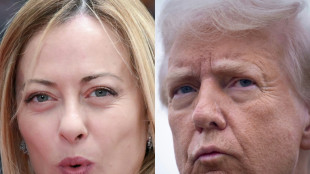
-
 F1 on Jeddah's streets - talking points ahead of the Saudi Arabian GP
F1 on Jeddah's streets - talking points ahead of the Saudi Arabian GP
-
Changing face of war puts Denmark on drone offensive

-
 Anger as China club plays hours after striker Boupendza's death
Anger as China club plays hours after striker Boupendza's death
-
Heat scorch Bulls to advance, Mavericks upset Kings

-
 Chinese investment sparks rise of Mandarin in Cambodia
Chinese investment sparks rise of Mandarin in Cambodia
-
Unease grows over Trump tariffs despite 'progress' in Japan trade talks

-
 Nigerian mixed-faith families sense danger as violence flares
Nigerian mixed-faith families sense danger as violence flares
-
Asian markets boosted by 'Big Progress' in Japan tariff talks

-
 No room for sentiment as Hinault returns to site of world title glory
No room for sentiment as Hinault returns to site of world title glory
-
ECB ready to cut rates again as Trump tariffs shake eurozone

-
 Heat scorch Bulls to keep playoff dream alive
Heat scorch Bulls to keep playoff dream alive
-
Nigeria, Niger foreign ministers meet for security talks

-
 Rugby Australia hits out at French clubs poaching young talent
Rugby Australia hits out at French clubs poaching young talent
-
Canada PM Carney avoids French blunder as he faces attack in key debate

-
 El Salvador becoming 'black hole' for US deportees, critics fear
El Salvador becoming 'black hole' for US deportees, critics fear
-
Trump admin proposes redefining 'harm' to endangered animals

-
 Australia's Mary Fowler set for long lay-off after ACL injury
Australia's Mary Fowler set for long lay-off after ACL injury
-
Rubio to meet French leaders for talks on Ukraine
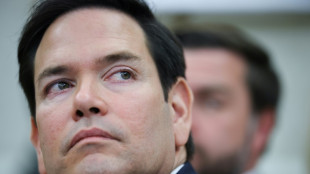
-
 Webb spots strongest 'hints' yet of life on distant planet
Webb spots strongest 'hints' yet of life on distant planet
-
Evotec SE Unveils New Strategy and Provides 2025 Guidance Bolstered by Strong Q4 2024 Results

-
 Arteta's Arsenal come of age with Madrid masterclass
Arteta's Arsenal come of age with Madrid masterclass
-
None spared in Nigeria gun, machete massacre: survivors

-
 'No problem' if Real Madrid replace me: Ancelotti
'No problem' if Real Madrid replace me: Ancelotti
-
Inter dreaming of treble glory after reaching Champions League semis

-
 'No limits' for treble-hunting Inter, says Pavard
'No limits' for treble-hunting Inter, says Pavard
-
Inter off Bayern to reach Champions League last four

-
 Rice 'knew' Arsenal would dethrone Real Madrid
Rice 'knew' Arsenal would dethrone Real Madrid
-
US stocks fall with dollar as Powell warns on tariffs

-
 Arsenal oust holders Real Madrid to reach Champions League semis
Arsenal oust holders Real Madrid to reach Champions League semis
-
Arsenal defeat Real Madrid to reach Champions League semis

-
 AMD says US rule on chips to China could cost it $800 mn
AMD says US rule on chips to China could cost it $800 mn
-
Inter hold off Bayern to reach Champions League last four

-
 El Salvador rejects US senator's plea to free wrongly deported migrant
El Salvador rejects US senator's plea to free wrongly deported migrant
-
Newcastle thrash Crystal Palace to go third in Premier League


Can biodiversity credits unlock billions for nature?
For supporters, biodiversity credits could unlock billions in much-needed funding for nature, but critics fear a repeat of scandals that have dogged other financial approaches to protecting the environment.
Paying to safeguard tropical rainforests or compensate for habitat destruction is an area of growing interest, and trading credits in conservation will feature at this month's UN COP16 biodiversity summit in Colombia.
The market in biodiversity credits or certificates -- which monetise activities that claim to protect or restore nature -- is new, unregulated and stalked by fears of "greenwashing".
Backers say credits could financially compensate for ecological harm caused by industry, for example when a mine or road project impacts the surrounding environment.
Businesses could, in theory at least, offset damage by purchasing credits from organisations that support nature and biodiversity through wetland conservation or sustainable rubber production, for example.
Ensuring integrity -- in short, that credits actually do for the environment what they promise -- is an enormous challenge for a sector that has no common international standards to speak of.
The voluntary market in carbon credits stalled after revelations that some of the most widely traded offsets did not reduce heat-warming greenhouse gas emissions as promised.
But at the last biodiversity COP nations agreed to earmark $200 billion a year for nature by 2030, and credits are being seen as one way to raise the cash.
- Gaining traction -
That agreement encouraged nations to promote "innovative schemes" including biodiversity offsets and credits.
Businesses and governments hope that COP16 in Cali -- which starts October 21 and is expected to attract 12,000 attendees -- can boost confidence in biodiversity credits.
The International Advisory Panel on Biodiversity Credits, an independent body supported by the governments of France and Britain, is to present a "global roadmap" for the sector.
It wants to encourage countries to have strong national credit schemes rather than strive for standard rules for international trade, which many admit could be unfeasible.
The Alliance for Biodiversity Credits, backed by the UN, and the World Economic Forum is also looking to promote initiatives at the Cali meet.
Elsewhere, similar proposals are attracting high-profile support.
In September, European Commission president Ursula von der Leyen called for the creation of a "nature credits" market to "reward those who serve our planet", pointing to farmers involved in sustainable agriculture.
Brazilian President Luiz Inacio Lula da Silva has mooted a global fund for rainforest conservation that considers paying countries for areas of forest that are protected or restored.
- Challenges -
Many environment groups are wary, fearing money generated from biodiversity credits will not benefit conservation or indigenous communities living closely with nature.
The idea of "selling nature to save it" has been around for decades and today, companies everywhere proudly display their sustainability commitments in product advertising or annual reports.
But the idea has not gone global, and creating common international rules for the trade of biodiversity credits could prove insurmountable.
Discussions around international standards for the trade of carbon credits -- where companies or countries pay to offset their greenhouse gas emissions -- are far more advanced.
But UN efforts to enshrine a globally-accepted framework has not concluded, and the COP28 in the United Arab Emirates last year ended without agreement on the issue.
This bodes ill for biodiversity credits, which have their own set of unique challenges.
Carbon offsets, for example, are at least based on the same, consistent unit -- a single credit represents one tonne of carbon dioxide either removed from the atmosphere or prevented from entering it.
"For biodiversity, we don't really have a metric," said Alain Karsenty, economist at the French agricultural research organisation CIRAD.
"A credit that would compensate for the destruction of a forest in France with a forest in Gabon would make no sense" because the two are not comparable or interchangeable, he said.
Y.Aukaiv--AMWN



